Stella Assange: 'it's too late for Navalny, but it's not too late for my husband Julian'
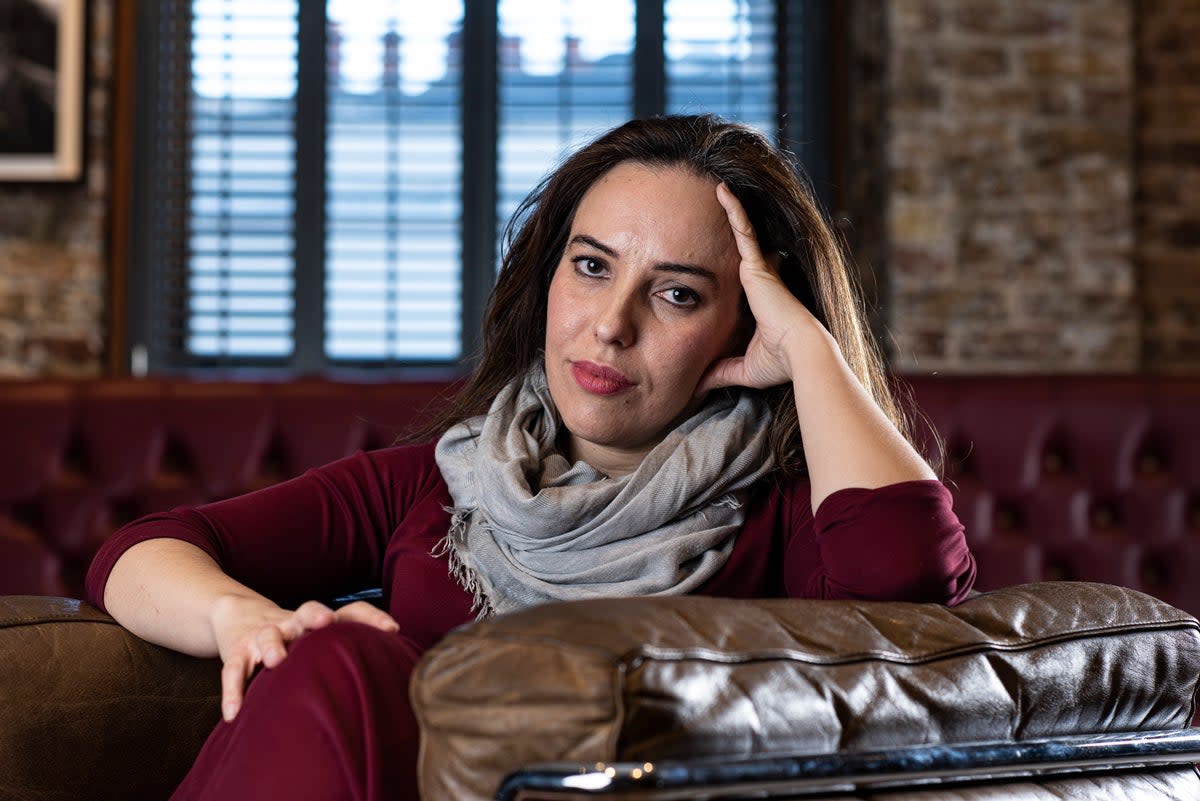
Stella Assange — human rights campaigner, wife of the incarcerated WikiLeaks founder Julian Assange and mother of his two youngest children — is sitting on the stage where her husband first leaked the Afghan war logs in 2010, telling me about her latest dream. She’s standing in an airport, having just missed her flight to Assange’s hometown of Melbourne, and looks back to see what the commotion behind her is about. There’s a man on the floor and she realises it’s Assange, her partner of the last 13 years and the man at the centre of this week’s freedom-of-information wars after a crucial final attempt at blocking his extradition to the US.
‘He’s convulsing and foaming at the mouth,’ she tells me, visibly disturbed by the details of this particular dream, which woke her at 3am (she’s started writing her dreams down, so she can discuss the details with Assange when he makes his 10-minute morning phone call from HMP Belmarsh, the maximum security prison in south-east London where he has been locked up since 2019).
‘The people around him aren’t helping; they’re kind of just standing by,’ she continues. ‘I run back to help him and I’m wearing a model of Dr Marten boots that came out a few years ago called the Assange, and my shoelace snags. I manage to un-snag it and put Julian in the recovery position. He sits up and holds me in his arms while people just look at us.’
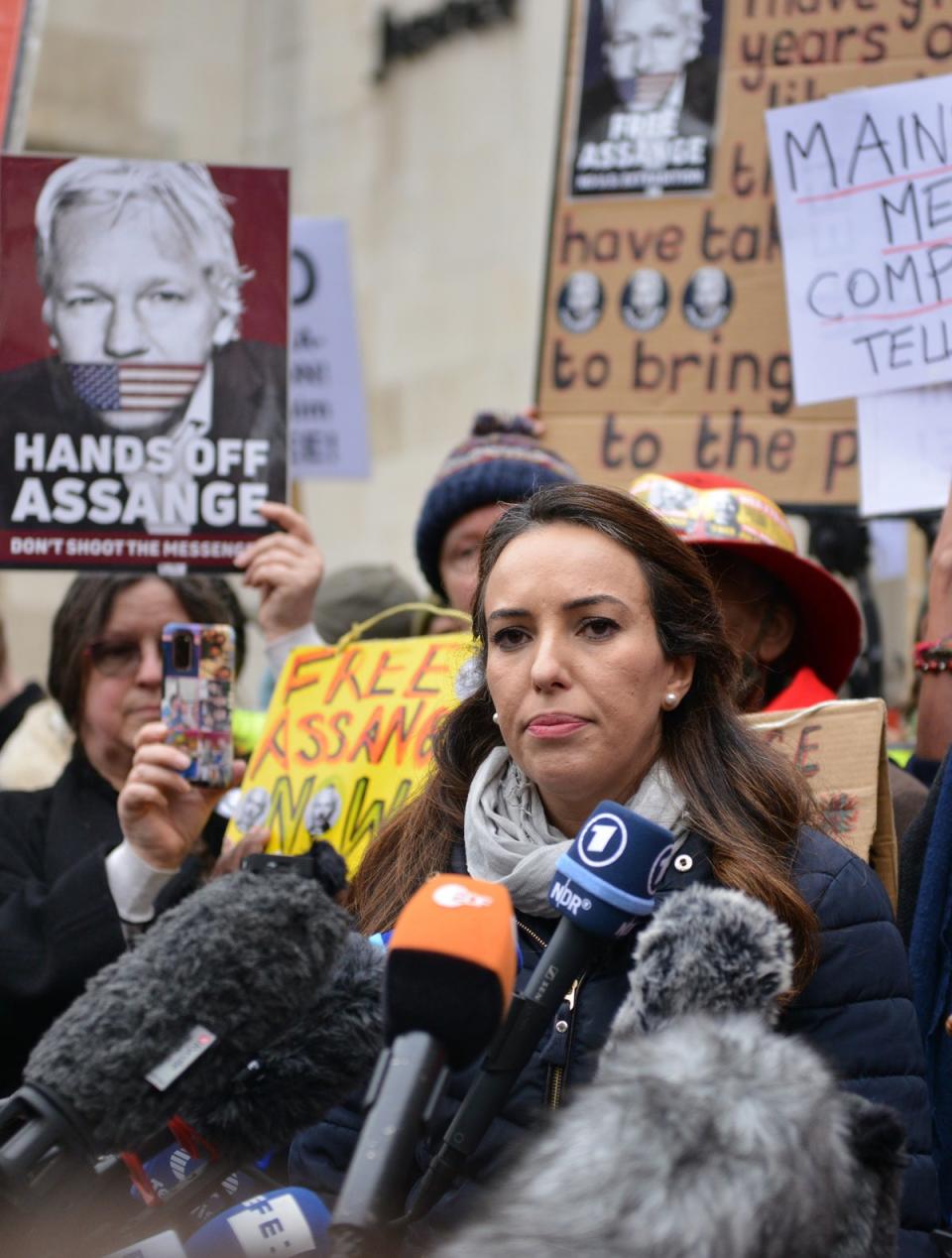
It’s a vivid, disturbing image — much like many of Stella’s dreams at the moment and a metaphor for the worst case scenario she fears could well have become a reality by the end of this week: of desperately fighting for her husband’s life while the world watches on in horror. Just days after our meeting and possibly as soon as the end of today comes what she and her fellow Assange supporters have long been calling Day X, the outcome of a two-day public hearing that is likely to be the Australia-born whistleblower’s last chance at stopping extradition to the US, where he faces 175 years in prison on espionage charges after exposing thousands of documents relating to the Afghanistan and Iraq wars.
That extradition, if successful, would make Julian Assange, 52, the first publisher in the world to be tried under the Espionage Act, which supporters fear would set a dangerous precedent for journalism and freedom of speech more widely — and which his wife, 40, fears would effectively be a death sentence. ‘He could be on a plane within days. His health is in decline, mentally and physically. His life is at risk every single day he stays in prison, and if he’s extradited, he will die,’ she tells a press conference before our meeting at the Frontline Club, a members’ club for journalists in Paddington.
She finishes a quick espresso and films a few lines with an Australian TV crew (Australia’s prime minister is ramping up the pressure on the UK and US, saying he hopes Assange’s case can be ‘resolved amicably’), before finally sitting down for a more heartfelt conversation about life at home with sons Gabriel, six, and Max, five; the aspects of fatherhood she feels Assange has missed out on; and how she feels about the death of Russian political prisoner Alexei Navalny just days before her husband’s hearing.
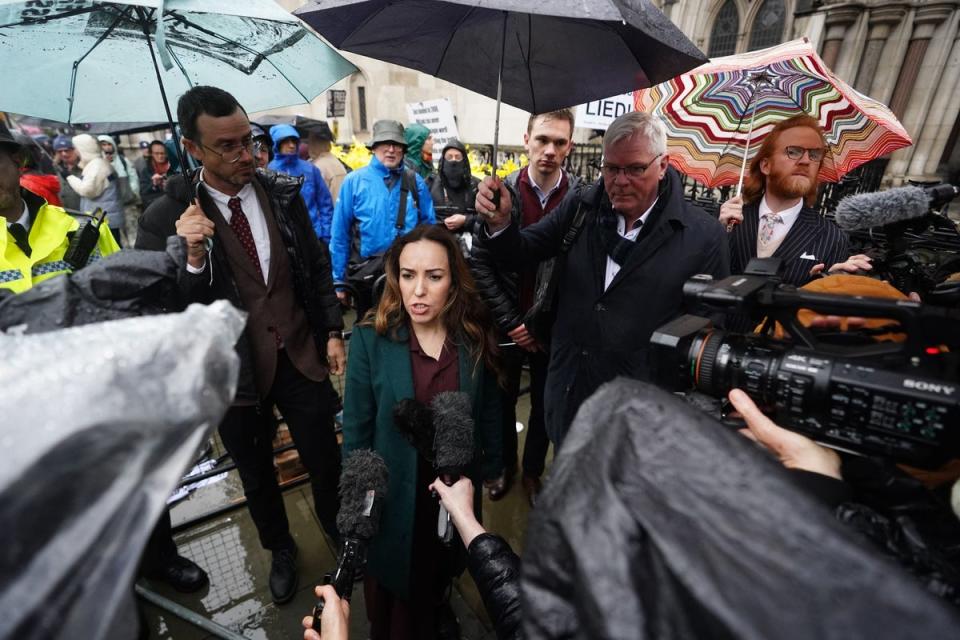
‘It’s no longer possible to save Alexei but it’s not too late for Julian,’ she says. ‘Navalny was a political prisoner who died in a high-security Russian prison, while Julian is a political prisoner who has been held in Belmarsh Prison for almost five years and is on the verge of being sent to the country that has previously plotted to assassinate him… The UK has an opportunity to distinguish itself from Russia in this respect. It is late in the day, but it is not too late. The same goes for the US.’
For Stella, this week’s hearing is about more than just her husband, but freedom of the press around the world. ‘Julian’s case makes the world more insecure, it puts journalists at risk of imprisonment and persecution,’ she tells me, nodding to the current unrest in Eastern Europe and the Middle East (she has a degree in refugee and international law). “With the wars underway in Ukraine and Gaza, journalists have been targeted, and that’s because there’s a fear with all parties that the public gets a true understanding of what’s going on, because the public doesn’t like war. Journalism is under attack on many different fronts... We have no free speech without freedom of the press. And there is no freedom of the press as long as Julian remains imprisoned.’
Stella speaks about this a lot — but today she is hyper-focused on the singular task of freeing her husband. “There really is no further appeal possible in the UK if he loses this round,” she says, having called this week ‘endgame’ in the rollercoaster battle that has been their last five years. ‘Julian is already in really difficult, harsh conditions in Belmarsh [he currently spends at least 21 hours a day in a single cell and doesn’t sleep, according to his wife], but compared to what the US has in store for him that’s a walk in the park. The idea of him being in a US hellhole is completely intolerable.’
Julian’s life is at risk every day he stays in prison, and if he’s extradited, he’ll die
It’s my third time meeting the South African-born lawyer turned freedom-of-information campaigner since 2021, when she was still Stella Moris, Julian’s newly-outed fiancée, and spent the majority of our hour together nervously scratching her hands around the diamond engagement ring she bought for herself on Assange’s behalf while he was in London’s Ecuadorian embassy five years previously.
Back then, it had only been a year since she’d been unmasked as the secret partner of the WikiLeaks founder and mother of his two previously-unknown youngest children (both boys were the spitting image of their father even then). The pair met in 2011 while Assange was claiming diplomatic asylum inside the Ecuadorian Embassy after disclosing national defence information relating to the Afghanistan and Iraq wars, including footage of US soldiers shooting and killing civilians from a helicopter in Iraq. The US said WikiLeaks had put its intelligence and military lives at risk, while Assange and his supporters argued that the public had a right to know and that the US was shooting the messenger.
A multilingual Soas and Oxford-graduate, Stella was on Assange’s legal team and they fell in love in a series of relationship milestones that read like fiction: she told him she was pregnant via a written note in case the room was bugged (Assange is believed to have other children, including a son from his previous marriage); he proposed via a virtual reality headset; and he watched both births via livestream.
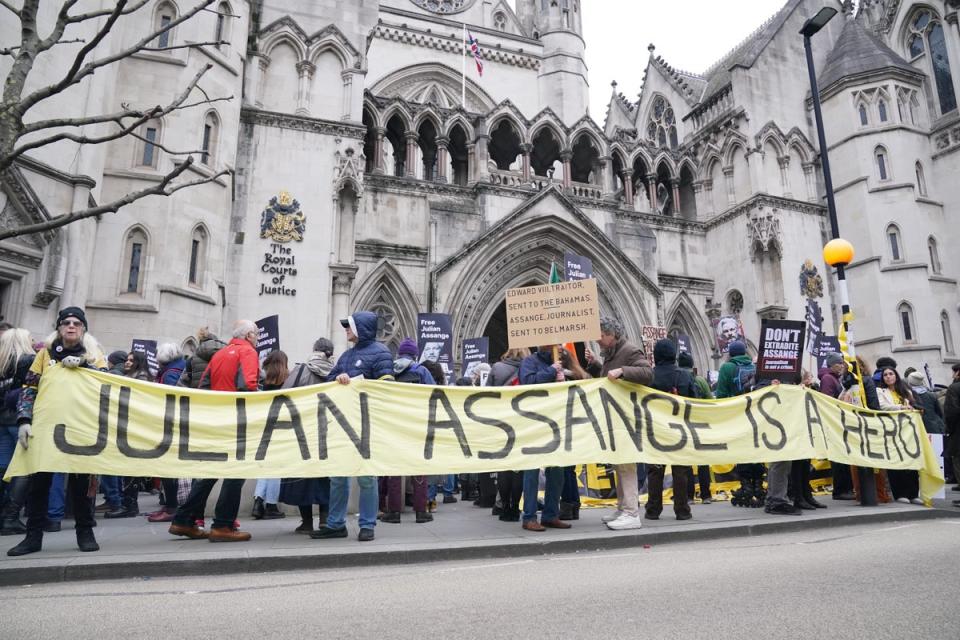
The pair only went public with their relationship in April 2020 after Assange had attempted to secure bail at his now wife’s home due to what his lawyer called ‘a very grave risk of Covid’ inside prison. They announced their engagement the following year and the wedding in 2022 — held inside Belmarsh — was the culmination of a five year-long battle after years of keeping their relationship secret.
Stella has spent years retelling hers and Julian’s fantastical, 13-year, spy-movie-rivalling love story since then and is clearly a lot more comfortable under the interview spotlight today. This time there is little of the anxious hand-scratching and she is more polished and poised (last time she was in a beanie hat; today she wears lipstick, a silk shirt and tailored trousers). She still speaks slowly in an American accent, with long drawn-out pauses between words, but sits more assertively, as though familiar with the whole process now.
‘You have to strike a balance between adapting and being outraged at every step,’ she tells me of her coping mechanism over the past two years. When we last spoke, it was just a few days after hers and Assange’s extraordinary Belmarsh wedding, which saw them exchange rings in a small Catholic ceremony and wear bespoke outfits by the late British designer and supporter Vivienne Westwood.

In the 24 months since, daily phone calls (capped at 10 minutes) and weekly visits (the prison decides when these can take place) have kept them going — just. Assange has been ‘very stressed’ about the impending public hearing — his first in more than a year — and hardly sleeping, using a typewriter that he was eventually granted to him in prison. ‘I hope he will one day be able to explain to the world what he’s been going through.’
Stories of Assange’s rude, narcissistic manner are common among those who have met him and the allegations of rape and sexual assault, made in 2010, persist. But his wife is naturally gushing about her husband, his ‘playful’ sense of humour and the fatherly experiences her boys have missed out on: the cycling lessons; the fishing trips; the conversations about science she knows he’d handle well.
At home, she tries to keep the boys’ upbringing as normal as she can. She speaks of ‘when’ not if their father will come home, and smiles as she speaks of the wall chart her eldest, Gabriel, has created for ‘counting up’, not down, to his father’s return. Who’s been her support through all of this? ‘I’ve really had to rely on my support network — which thankfully I have. My family have gone above and beyond, but it’s been very demanding. My mum was also caring for my dad,’ she says, in a nod to her father, who passed away last summer.
Within a space of 12 months we lost Vivienne Westwood, Daniel Ellsberg and John Pilger. They all fought tirelessly until the end for Julian
Stella turned 40 in November but there were no celebrations. ‘It just doesn’t feel right to celebrate things that Julian can’t take part in,’ she says. It’s their two-year wedding anniversary on 23 March and she’d love to arrange for her wedding dress and Assange’s wedding kilt to be shown publicly through the Vivienne Westwood Foundation.
‘It’s tragic that she never was able to see Julian as a free man,’ she says of Westwood, who died in December 2022. ‘Within a space of 12 months we lost Vivienne Westwood, Daniel Ellsberg [the US activist and economist] and [Australian journalist] John Pilger. These were giants in their own right who fought tirelessly until the end for Julian.’
But right now Stella can’t dwell on wedding dresses, nor the situations in Ukraine and Gaza (‘it seems like [violating international law] is becoming more and more normalised — and that is catastrophic’), nor what she’ll do if the worst happens at the hearing — because she must remain focused on her role in all of this: drumming up public support, which she believes will be key. Fortunately, that’s not been hard.
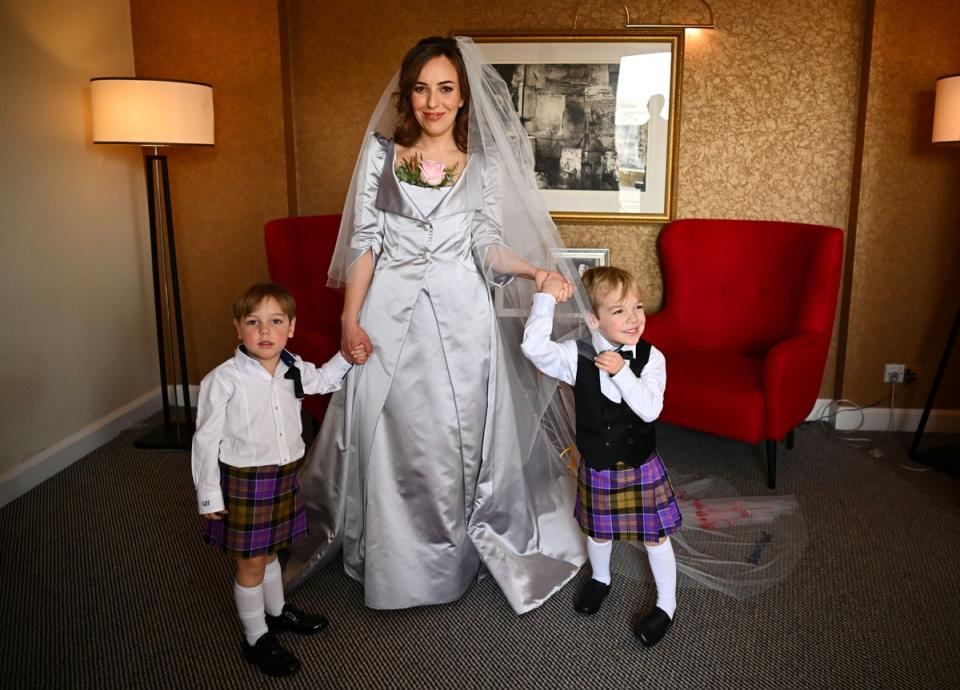
Even staunch opponents of Assange’s views have publicly denounced the ‘absurd’ charges of spying that he faces. Is she hopeful then, that her husband could one day be freed? Stella pauses. She finds it ‘almost unbearable’ to think of the five years Assange has already been robbed of with her, with their children, with friends who have now passed away. She knows that the odds of her husband being freed are against him — and even if the appeal is successful, a full appeal may well be delayed until after this year’s US elections.
Still, there are glimmers of hope. ‘The US could just drop [the case] if they wanted to, and still have made Julian suffer and made an example of him to intimidate the press. So I think everything turns on public opinion — and that’s a reason for hope, because public support is building.’
She allows herself to smile when I ask about recent shows of international support: the assertive statements from the Australian government; the Italian cities including Rome and Naples that have granted Assange honorary citizenship; the Russian artist Andrei Molodkin threatening to destroy £36m of art by the likes of Picasso and Rembrandt if Assange dies in prison. ‘The artwork will only be destroyed if Julian dies in prison, so it’s not some kind of nihilistic stunt; it’s the artistic community stepping up to try to do something to save Julian’s life,’ she says. ‘It shows solidarity.’
Everything turns on public opinion — and that’s a reason for hope, because public support is building
She cracks a smile, too, when I ask about the thought of her husband coming home one day. Her dreams at night are always darker than that, but she allows herself to daydream of it sometimes — for the kids. ‘I imagine us in a quiet place finding our footing, somewhere where he can meditate and experience nature, where he is not rushed into the media glare and we have time and space for ourselves as a family,’ she says.
It’s a peaceful image, and one that sustains her. She doesn’t know whether Assange will be home tomorrow, in a year, if ever — but he could be. ‘I have to hold on to that.’


